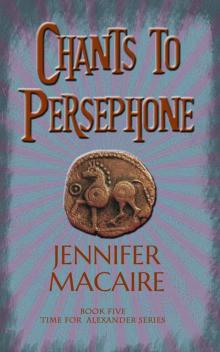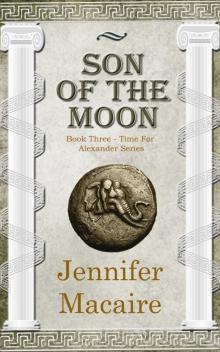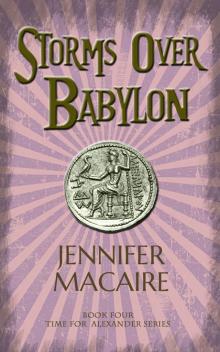- Home
- Jennifer Macaire
The Eternal Banquet Page 6
The Eternal Banquet Read online
Page 6
So there we were, a man with a donkey, two slave women, and a blonde woman in red robes, looking over the wall. The priests rushed by us, asking breathlessly if anyone had seen a boy, about so high, running away.
The man with the donkey raised his eyebrows and said ‘no’, emphatically. The slave women shook their heads, and so did I, looking as puzzled as possible.
The priests ran on, and the man with the donkey turned to me and said something in Phoenician which I didn’t understand, so I just shrugged and shook my head. He seemed satisfied and shook his head as well. He must have said something like, ‘What a terrible event!’ The two slave women turned and carried their jars towards their home, and the man with the donkey continued along his path. I leaned against the wall and shook just as hard as the boy huddled between my legs.
When the coast was clear, I tore my cloak in two and put one half on the boy’s head like a turban and one around his waist as a loin cloth. He became my slave boy, dressed in the colours of his master, carrying a large jar I hastily purchased from the first merchant we met.
The priests passed us several times on our way down the hill. They glanced at me, but then again, everyone did. I was tall and blonde and tended to stand out. However, they didn’t look twice at the slave boy carrying my goods. And the boy was careful to hide his face each time they passed. The priests would soon have the entire city stirred up, so I headed directly to the docks, towards the boat. It was the only thing I could think of doing at the moment. To go back to the inn would be folly; the innkeeper would be suspicious of a new slave. There was no one I knew living in Carthage at that time, the only person I’d ever met who’d even been to Carthage was Phaleria, perhaps she’d know what to do.
‘What to do?’ she cried, her face drained of all colour. ‘Are you mad? Have you lost your senses? This boy is the sacrifice for tomorrow’s victory celebration! Of course we can’t keep him! Soon the whole harbour will be sealed off, and the soldiers will search each house and boat looking for him. We can’t keep him here, we’ll all be executed!’
‘We can’t turn him in,’ I said desperately, ‘they’ll kill him!’
‘He was chosen by the Snake God,’ hissed Phaleria, pacing back and forth in the small space of the cabin, her eyes frightened.
‘The who?’
‘The Snake God. The priests select several youths especially for the sacrifice. The boys stand together on woven grass mats, and the sacred cobra slithers out of the basket. The one the Snake God touches is chosen.’ She’d barely finished speaking when a trumpet blew from the palace. Its sound was taken up by others until the whole city was full of sound.
‘I’m sorry. I wasn’t thinking, but Phaleria, we can’t give him back, they’ll kill him!’
‘I know,’ she spoke as if she were speaking with a slightly simple child. ‘I know that. I was here before. I saw what happens. The boy rides a white bull to the temple on the island. Scarlet and white ribbons are tied to the bull’s horns and the boy’s hair. The ribbons flutter in the breeze. Then the boy is helped off the bull. A priest cuts off a lock of his hair and throws it into the sacred fire. The boy is tied to the wooden post and then …’ Her voice trailed away.
‘And then he’s burned alive,’ I finished for her, my own voice gentle.
‘He was so beautiful,’ said Phaleria, her hand coming to her mouth. ‘I was only fifteen and the boy was not much older. I saw him and fell in love with him instantly. I was infatuated, the way a fifteen-year-old girl can become infatuated with a boy after just one glance. He turned his head and our eyes met. His dark eyes were filled with fear and hopelessness. When he saw me his face changed. My feelings must have shone from my face like a beacon, and it gave him hope. It was the worst thing I could have done. Suddenly he began to struggle to escape. His eyes never left mine, even when the priests surrounded him and carried him, kicking and yelling hoarsely, to the pyre. When they cut off a lock of his hair, they cut his temple, and I can remember the red blood streaming down his face. He kept screaming, over and over, words I couldn’t understand. And then they burned him.’
Phaleria looked at her fists and unclenched them. Bright red crescents marked where her nails had dug into her palms. She studied the boy. He was staring at her with an intensity that was painful. He didn’t speak our language, but he understood what was happening. His fate was being decided again.
‘All right,’ she said. ‘All right. We’ll try to hide him. By the gods, Ashley, you’re putting us in danger. If he’s caught we’ll all burn; you, me, Iskander, Paul, Demos, Plexis, Axiom, and Yovanix.’ Each name received the weight of her fear behind it, and I saw them already dead, already executed for my action. However, my eyes kept straying to the thin shadow in the corner, the quiet boy with the burning eyes, and I smiled.
‘You weren’t with us in India,’ I said.
‘No, what do you have in mind?’
‘I need one of our glass fishing buoys, lead weights, and strong rope. If we can get these, the soldiers can tear the boat apart and they will never find him.’
The rest was easy; Alexander and Demos rigged a diving bell from a buoy, and Axiom fixed the weights to it using the rope and intricate knots. No one protested, once the plan was set out. Everyone was ready to sacrifice his life.
Plexis, Axiom, and Alexander spoke Phoenician fluently. The boy heard what he had to do. He nodded, his eyes shining. The only expression in them was relief. When the Imperial Soldiers and priests came to our boat, we were ready.
They were thorough. They searched methodically, emptying the boat and tapping the planks, looking for a secret hiding place. They used long, thin knives, poking them systematically into sacks of grain and bales of wool. They put all boats under temporary arrest, blocked the harbour, and closed the inns. Private homes were searched with the same zeal, and the people who were near the temple when the boy disappeared were taken to the Imperial Palace for questioning. The boy wasn’t found, for who would think of looking for him underwater?
Chapter Five
Next morning I dressed carefully in order to go to the Imperial Palace to answer the summons of the royal guard. I was a suspect in the case of the missing sacrificial victim.
I said that jokingly to Axiom and he shook his head sorrowfully. No one was smiling that morning except the boy we’d saved. He peered out of the hiding place we’d made for him and his grin was as wide as the ocean. Phaleria caught him with his head poking out and hissed at him, making him disappear back into his corner behind a false wall.
I watched in silence as Alexander put on my false hand, lacing it up and giving it a little shake. The fun was missing from his eyes as well. He looked tense, and when a slave dropped an amphora of wine onto the stone jetty, he jumped.
‘What is it?’ I asked.
He shook his head. ‘Never have I heard of a sacrificial victim being saved. What will the gods think?’
‘You know what I think?’ I said darkly, meaning to tell him just exactly what I thought, but he pressed his finger against my lips.
‘No. No, Ashley. This is one of the times that the gulf separating us is too great to be crossed. We are all frightened of the gods’ choler. Only you are free of them.’
‘What about Plexis? He doesn’t seem frightened.’
‘You know Plexis. He should have been an actor.’
Plexis went with me as my lawyer, and to translate. He put on his finest tunic and wore a gold circlet in his dark hair. He looked like a prince, and the people at the palace were suitably deferential.
The man with the donkey and the two slave women were there, as well as at least twenty other people. One I recognized as the merchant who’d sold me the jar of oil.
Luckily, he didn’t make the connection between the escaped sacrificial victim and my slave boy. To complete the masquerade, we dressed Paul as a slave. He wore a red loincloth and a red turban hid his golden hair. He walked behind us, fanning me with a graceful fan made of white egret fea
thers.
The palace was huge. Slaves led us to a large, luxurious room. One wall was covered with small cubbyholes where the tasselled ends of scrolls were visible. There must have been five hundred scrolls there – an incredible fortune. A statue graced another corner. It was Greek, made of white marble painted realistically. It made me pause. I wasn’t used to seeing statues painted that way, although Plexis assured me that it was how they did it in Athens. The eyes were set with dark blue stone, the lips were painted red, and the robes blue. Tapestries covered the floor. On the walls, mosaics depicting life in Carthage, with brilliantly coloured birds and flowers made of semi-precious stones and glass, glittered in the sunlight that flooded the room from large windows. There was so much to look at that I was still gaping when the heavy, ornately carved door swung open and a thin man stepped in, his face creased with worry. He carried a scroll in one hand and a gold sceptre in the other. For a minute I thought he might be the king, but no, he bowed to us, something a king never does, and motioned for me to take a seat.
I sat on a large cushion placed in the middle of the floor and nodded towards my ‘slave’ boy to remain behind me. Plexis stood on my right, on his face a look of polite interest.
The man introduced himself, Scipio Atticas, counsellor for the prince Hamilcar, who was the commander of the army. His face didn’t lose its painful tightness during the entire interview. He spoke to me, waiting for Plexis to translate. He watched me closely as I spoke and then listened gravely as Plexis gave him my answer.
‘Where were you yesterday at the time of the escape?’ was his first question.
‘I was taking a walk along the small path which leads along the crest of the hill.’
‘Did you see a young boy leap over the wall at any point?’
‘No, I saw only a few people; a man with a donkey, two women with clay jars on their heads, and some other persons. I didn’t really take any notice.’
‘And where was your slave all this time? The man with the donkey said he wasn’t with you when the alert was given. The merchant further down the road said he was with you when you bought the oil.’
‘The boy was hot. I let him rest in the shade. I gave him instructions not to make a pest of himself. He must have fallen asleep. I found him exactly where I’d left him. He came with me to buy some oil and he carried it back to the boat.’
The counsellor looked at his scroll and nodded. ‘Everything you said has been corroborated by different witnesses, and your boat was found to be hiding no boy. You are therefore free to go.’
‘Thank you,’ I said, rising from my cushion.
‘I hope you will attend the ceremony. For the trouble we have caused you, we are extending an invitation to the sacred island.’
I watched Plexis as he translated this, and he looked as startled as I felt. However, he made a subtle gesture with his hand, meaning I should agree.
‘It’s a great honour,’ I said. Almost as an afterthought, I asked, ‘What will happen now? Is there another victim?’
Plexis coughed delicately, and nearly didn’t translate. The man paused for a long time before answering. ‘The boy who escaped will be replaced by my only son if we don’t find him. That is why I have been appointed to investigate. You see, they know I will do everything in my power to discover where he’s gone. My own boy’s life is at stake.’
Plexis translated as he spoke, so there was no time for him to soften the blow of the words. We discovered the truth at the same time, and stared, horrified, at the man. He looked at us and a wry smile flickered over his face. ‘I love my son. He is all I have left since his mother died. I must admit, I was hoping that your slave would turn out to be the escaped boy, but I saw right away it wasn’t.’ He bowed, indicating the interview was over.
We walked back to the boat through crowded streets, the orange sun setting at our backs, casting long shadows before us. I couldn’t feel my feet hitting the ground. I was suffocating with the horror of what I’d done. ‘Now what?’ I asked, when I found my voice.
‘What do you mean, “now what”? We make our excuses not to go to the ceremony, and we sail away, that’s what,’ said Plexis forcibly.
‘No.’ I put my hand to my face and wiped away the blood that had started to trickle from my nose. ‘Give me a handkerchief, will you? No, we can’t go. That man is going to lose his son by my fault. I won’t stand by and let that happen.’
We were silent for the rest of the walk. As Plexis had so pointedly once said, ‘The streets have ears.’
Once back in the boat, I sought Alexander. If anyone could save a prisoner from the palace it had to be him. He’d planned more battles than anyone else I’d ever known. He was always talking strategies, a tone of regret in his voice, as he looked at a fortress or unbreachable wall. I told him what had happened, my voice shaking with sorrow. He listened as he always did, giving me his full attention. When I finished speaking, he tilted his head to the side, thinking. A dreamy look had come into his eyes, and he was almost smiling.
‘We may all get killed,’ he said reflectively, ‘but I think it can be done.’ He said no more, but went to find Demos. I heard him mutter softly to himself, ‘Damn Nearchus, never around when I really need him …’ Then he was gone. I sank onto a bench. I couldn’t get the man’s face out of my head. His eyes had been so bleak. His only son, he’d said. I shuddered.
In the morning, an official came to the inn and delivered an invitation to the ceremony. He was accompanied by two drummers, and the innkeeper stared at Alexander and me with awe. Not many people had been invited to the sacred island, the innkeeper told us after the official had gone. We pretended to be suitably impressed.
That evening, the trumpets of the city blew brassy swan cries through the still air, announcing the start of the ceremonies. Criers ran through the streets shouting the news. The Snake God had chosen a new sacrificial victim! People, dressed in their finest clothes, gathered in family groups. The streets were packed with revellers and musicians, jugglers and acrobats. We were submerged in the crowd. I held onto Alexander’s arm with a hand that was as cold as ice despite the thick heat of the evening air. Everyone was pouring down towards the harbour, eager to get places along the sea wall to better see the sacrifice.
Alexander and I were the only ones from our boat going to the ceremony. Everyone else had a role to play. Paul was obliged to be a slave to the very end, so, dressed in his slave garb, he stayed on board the ship. He acted glum, as if all he’d wanted to do was watch the ceremony, and here he was stuck on a boat. The crew, Kell, Titte, and Oppi, were to mingle with the crowd and stay near the ship.
The comedy was necessary. Since the original sacrificial victim was hidden below deck; we didn’t dare leave the boat alone. Paul was part of the deception. He was only ten years old, but he was mature for his age. Sitting on the deck, he observed a small squadron of soldiers standing on the end of the pier. He held a wineskin full of sweetened wine, and he watched the soldiers pensively, waiting for the right moment to drop the wine onto the stone pier. If Plexis’s scheme went as planned, the soldiers would grab it and drink, laughing and teasing the slave confined to his boat, then toss the empty wineskin back at him, jeering at Paul to tell his master he’d finished all the wine himself.
In the wine was a powerful sleeping draught. Soon after the soldiers drank it, they would fall asleep in a puzzled heap, their legs wobbling and folding under them as their minds clouded and went dark. That was when the crew would untie the boat from the pier and quietly push her out into the harbour under cover of darkness.
Axiom and Demos were drinking toasts with the guards all along the waterfront, acting the part of drunken traders delighting in the ceremonies.
Earlier, they had taken a dinghy and hidden it in a strategic spot behind a houseboat. When the time came, they would quickly row the dinghy to the sacred island, careful to avoid the sharp rocks placed around it to discourage landing.
Phaleria was plying wine on th
e far side of the harbour, and Plexis, the handsome prince from Athens, was right in the midst of the nobles.
It was a stroke of luck that Plexis had seen an old acquaintance. The man was amazed to see him alive – hadn’t he died in Persia? He had thought he’d heard something about an incredible funeral pyre erected for Hephaestion in Babylon.
It was another Hephaestion, Plexis assured the man, and have another drink. So, you’re a captain in the navy here in Carthage? How remarkable. Have another sip; the wine is excellent.
Plexis had an actor’s face and voice; he soon had the crowd singing hymns to the Greek god of wine, Dionysus, while he expertly singled out the men in charge of launching the warships and gave them huge draughts of fine wine – wine laced with enough sleeping potion to have them soundly snoring just as the ceremony began.
Alexander and I had the tricky parts.
I stood next to the man whose son was about to be sacrificed in honour of Nike, goddess of victory, and I tried not to let my panic show. He was beyond noticing though. His only son was about to be burned to death; not a thing a father wants to contemplate. The poor man was so stricken that tremors shook him constantly. I was amazed he was still standing.
The roar of the crowd grew to deafening proportions as the sun set and darkness claimed the city. Torches were lit and I saw that everything would be easier than I dared hope. It was a moonless night. The water was black as jet, and a breeze made the ribbons dance. The scarlet ribbons looked black in the torchlight.
The white bull gleamed. His coat had been brushed to a satin finish, and firelight made the animal look as if he were made of gold. On his back was a slender boy. His face was a mask of terror, his eyes two huge wells of despair. His hands were tied behind his back, and two priests, walking on either side of the majestic bull, held him tightly.
At the temple, the priests pulled the boy off the bull. The youth stood, swaying, while the crowd chanted and the high priest made the necessary absolutions. Then the placid bull was led to the altar, and while a strong man held the beast’s head, a priest took a golden knife and slit its throat. The bull died, a look of confusion in his great eyes, his knees buckling under him, while his steaming blood splashed into a bowl held by two priests.

 The Eternal Banquet
The Eternal Banquet Chants to Persephone: The Future of the World Hangs on a Knife's Edge - and Only a Human Sacrifice Can Save It
Chants to Persephone: The Future of the World Hangs on a Knife's Edge - and Only a Human Sacrifice Can Save It The Soul of Time
The Soul of Time Son of the Moon
Son of the Moon A Charm for a Unicorn
A Charm for a Unicorn The Road to Alexander
The Road to Alexander Jack the Stripper
Jack the Stripper Storms over Babylon
Storms over Babylon Virtual Murder
Virtual Murder